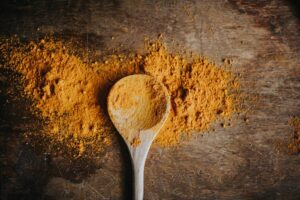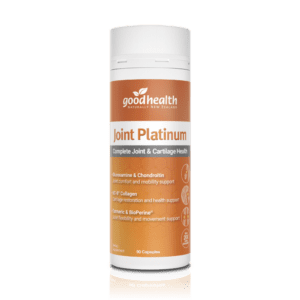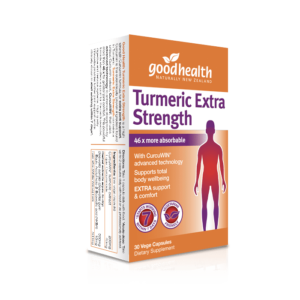
There are many ways to support joint comfort, especially when there is an overactive or consistent immune response in your body. This immune response is characterised by joint stiffness and problems with mobility and joint and muscle comfort. Whether you’ve been experiencing it a long time or you just overdid it in the garden yesterday, one thing is certain: when it is happening, all you want is for it to stop. Fortunately, there are some excellent and effective natural remedies and joint support supplements that can be supportive for the comfort of your joints and muscles and the regeneration of joint cartilage.
What contributes to morning joint stiffness?
-
Fluid Buildup:
During sleep, when movement is limited, fluid can accumulate in and around joints. This can make the surrounding tissues and muscles feel tight.
-
Immune proteins:
At night, the body releases small proteins that activate the immune system and contribute to joint stiffness.
-
Decreased Cortisol:
Cortisol, which supports the resolution of the body’s immune responses, naturally dips at night, which can lead to increased joint stiffness and discomfort.
-
Lack of Movement:
The absence of movement during sleep can cause the joint synovial fluid to temporarily thicken, leading to joint stiffness.
-
Sleep Posture:
Sleeping in an unsupportive position can put pressure on joints, especially if the mattress and pillow are old or not right for you.
-
Age-Related Changes:As people age, less synovial fluid may be produced, causing the cartilage in joints to dry out and stiffen.If joint stiffness lasts beyond 30-60 minutes after arising or you have any worries about your joints, please see your GP or regular health professional.
What can support joint function? – Cartilage and collagen
Cartilage acts as a shock-absorber allowing for smooth, painless motion. Once your cartilage deteriorates either from injury, overuse, or general wear and tear without the inputs required for your body to perform daily repairs–collagen and other dietary nutrients, and, not surprisingly, a consistent amount of sound and restorative sleep–movement becomes restricted and interferes with daily activities. Sleep and essential nutrient intake are vitally important for day-to-day joint recovery. If your cartilage isn’t what it was, don’t panic–there are plenty of natural things you can try.
Collagen is a tried-and-true joint supporter. This is why traditional human utilised the bones and connective tissues of animals in their collagen-rich broths. When denatured or broken-down collagen is consumed, it can support the production of new cartilage in joints. Supplement companies use hydrolysed collagen; “hydrolysed” collagen is another term for broken-down/denatured collagen.
Conversely, when undenatured or whole collagen is consumed, it is not digested or broken-down in the gut and so it remains intact when it reaches the final section of the small intestine. There it can interact with the immune cells in the gut to support the maintenance of cartilage tissue. Because not all dietary collagens from bone/tendon broths can be broken down by our digestion, these broths can technically provide both forms of collagen–denatured and undenatured–but you must make the broth using tendons and other connective tissues, not just bare bones, and try and eat some of the cooked collagenous tissues. You can also incorporate a variety of animal joint and marrow bones.
Combining regular intake of collagen broths with two different types of collagen supplement may be a good way to ensure you’re receiving the nutritional building blocks and positively immune-interactive substances to support your joint health. See 10 reasons you need to be drinking bone broth for more information.
Muscles and magnesium
 Muscles are commonly associated with tension, affecting most of us at some point, and weak or tight muscles can adversely affect our joints. Building and maintaining muscle can support overall joint health, but if your muscles are tight and tense all the time, whether it be from going to the gym, sitting in a car for long periods of time, or sometimes for no apparent reason at all, you may be lacking magnesium.
Muscles are commonly associated with tension, affecting most of us at some point, and weak or tight muscles can adversely affect our joints. Building and maintaining muscle can support overall joint health, but if your muscles are tight and tense all the time, whether it be from going to the gym, sitting in a car for long periods of time, or sometimes for no apparent reason at all, you may be lacking magnesium.
Magnesium is the mineral most associated with muscle relaxation. Magnesium deficiency is common these days due to our modern lifestyles. Your body uses up high amounts when under stress, and when you sweat, you lose magnesium. Unfortunately, it can be difficult for us to get the amount we need from foods, so a natural supplement may help. For muscle tension, magnesium can also be applied topically as a cream, directly to the affected area to help soothe and relax your muscles, joints, and nerves.
Alternatively, Epsom salts are a great source of magnesium sulphate that you can add to your bath. They have been used for centuries to support muscles, and, as an added benefit, they eliminate toxins from your body. The warm water combined with Epsom salts increases circulation, and besides, it’s a good excuse to enjoy a relaxing hot bath!
In terms of building and/or maintaining muscle mass, nutrition is key. See the health article Nutrition and Health for more details. Joints and synovial fluid respond so well to age-appropriate exercise, that some sort of daily movement or exercise regimen is highly recommended.
Other natural health options to support joint health

A protracted, or overactive, immune response is associated with so many of our modern health issues. This immune response is characterised by joint stiffness and problems with mobility and joint and muscle comfort. There are traditional and well researched herbs, spices, and nutrients that can support a natural resolution to a continuous immune response in the body.
- Turmeric: A popular spice that is added to curries to give it that brilliant golden colour and delicious flavour. Herbal grade turmeric, which you buy in a capsule or tablet in a turmeric health supplement, contains higher amounts of the active ingredient, curcumin. There are also curcumin-only extracts available that are particularly potent and constitute some of the best turmeric supplements for joint health support. Curcumin has powerful antioxidant and immune supporting properties, making it especially supportive of joints and muscles. Turmeric is one of the most well researched and effective herbal options for the support of a healthy immune response in joints on the market today.
- Boswellia serrata: Another of the most well-known herbs for supporting a healthy immune response in the body is boswellia, otherwise known as frankincense. Boswellia has been known for millennia as a support joint comfort and mobility, as well as for supporting nerve health and fluid balance around joints, especially at night.
- Glucosamine and chondroitin: Well researched ingredients that serve as building blocks of cartilage. These glycosaminoglycans support the transport of water, amino acids, and lipids in hyaline cartilage, and the elasticity and viscosity of the synovial fluid, supporting lubrication. They also support the cells that build cartilage, but this process is slow because there is no blood supply through the cartilaginous structure; the cells must respond from the outside in. Taking a glucosamine and chondroitin supplement over time can support your body to regenerate cartilage while you sleep. Think of it as a long-term strategy, not a short-term fix.

- Green lipped mussel extract: Another supplement that can support a range of joint-related symptoms. The active component in mussel extract, mucopolysaccharide supports the body’s immune defenses. It also contains an antioxidant called Superoxide Dismutase (SOD), which further supports joints and bones. The essential Fatty Acids DHA and EPA also support a healthy immune response, and seafood is particularly rich in these fats. Other animal and whole, raw dairy fats also contain DHA and EPA and also arachidonic acid, which is an important part of the immune response from initiation to resolution.
- Fish oil and krill oil: Both contain omega 3 fatty acids in their active forms–DHA and EPA–shown to be effective agents for supporting joints and muscles, and especially cartilage.
- UC-II® Type II undenatured collagen: a patented form of Type II undenatured collagen, which supports cartilage restoration and overall joint health. Unlike denatured “hydrolysed” collagen–very useful in its ability to be used as a building block for cartilage restoration, but required in large amounts–UC-II® is scientifically researched to retain its structure as it travels through the digestive tract, allowing it to positively interact with immune cells in the final part of the small intestine, all in 1 small daily dose of 40 mg. The immune cells then travel to joint tissue and cartilage, where they support the restoration and maintenance of healthy cartilage.
- Palmitoylethanolamide (PEA): Also known as palmidrol, PEA is a lipid modulating, fatty acid amide made in the body as part of a healthy immune response and oxidative processes. The problem is that production of this vital substance decreases with age, illness, and poor diet and lifestyle. PEA can support joint and nerve comfort, while also supporting brain and digestive function. PEA has been known about in scientific, military, and research circles since the 1950s as an alternative support for body comfort.
- Evening Primrose Oil: contains the omega 6, gamma linoleic acid, which may support joint health. Flax Seed Oil, in small doses, contains omega 3, 6 and 9 in the perfect ratio to support the immune response, provided the diet does not contain any other seed/vegetable oils and processed foods. Evening primrose oil also contains a very high amount of linoleic acid. Too much linoleic acid, a predominantly plant-sourced omega 6 fatty acid, can be harmful to your metabolism and encourage a protracted immune response. While flaxseed and evening primrose oil are good sources of “plant omegas”, do not rely on them to give you all your essential fatty acids. The plant omegas are poorly converted in the body with great variability between individuals. Animal fats are by far the best place to get the omega fats in the best ratios.
While joint and muscle tension may arise in different forms, for different reasons, there are a plethora of natural tools all designed for varying symptoms to combat it. If you’re unsure which is best for you, talk to your natural health provider or the naturopath team at Good Health. The best thing about joint problems is that they do not have to be permanent.
Joint health support supplements: do you need them?
While diet, lifestyle, and sleep quality play primary roles in joint health, supplementation can provide additional support. Good Health Platinum and Good Health Turmeric Extra Strength offer scientifically developed formulas to support joint mobility, comfort, and cartilage restoration.
 Good Health Joint Platinum
Good Health Joint Platinum
Good Health Joint Platinum is a scientifically formulated, joint support supplement combining Glucosamine, Chondroitin, UC-II®, Turmeric, and BioPerine® for complete joint and cartilage health. Glucosamine supports joint mobility and function, while Chondroitin lubricates cartilage to support cushioning and comfort. UC-II®, a patented, Type II undenatured collagen, supports cartilage restoration and overall joint health. Turmeric’s curcumin, enhanced with BioPerine® for 20x better absorption, supports flexibility and ease of movement. This advanced formula delivers a cutting-edge, comprehensive formulation to support joint mobility and comfort, and the restoration of cartilage health.
 Good Health Turmeric Extra Strength
Good Health Turmeric Extra Strength
A Scientifically researched formulation containing curcumin, Boswellia, and white willow bark. The unique curcumin extract, CurcuWIN®, supports absorption by more than 46 X. Ultrasol® technology increases the water-dispersity of the normally fat-soluble curcumin supporting a longer duration in the body for superior joint comfort and total body health. This powerful formula also supports the cardiovascular, digestive, and nervous systems. High quality boswellia extract, AKBA, provides further joint and muscle support and has been shown to start working within 7 days. White willow bark is traditionally used to provide support for joint and lower back comfort. Comes in 30, 60, and 90 capsules, with an easy, one capsule a day dosage.
For more information about joint health, see Good Health joint articles
TAPSPP1478

